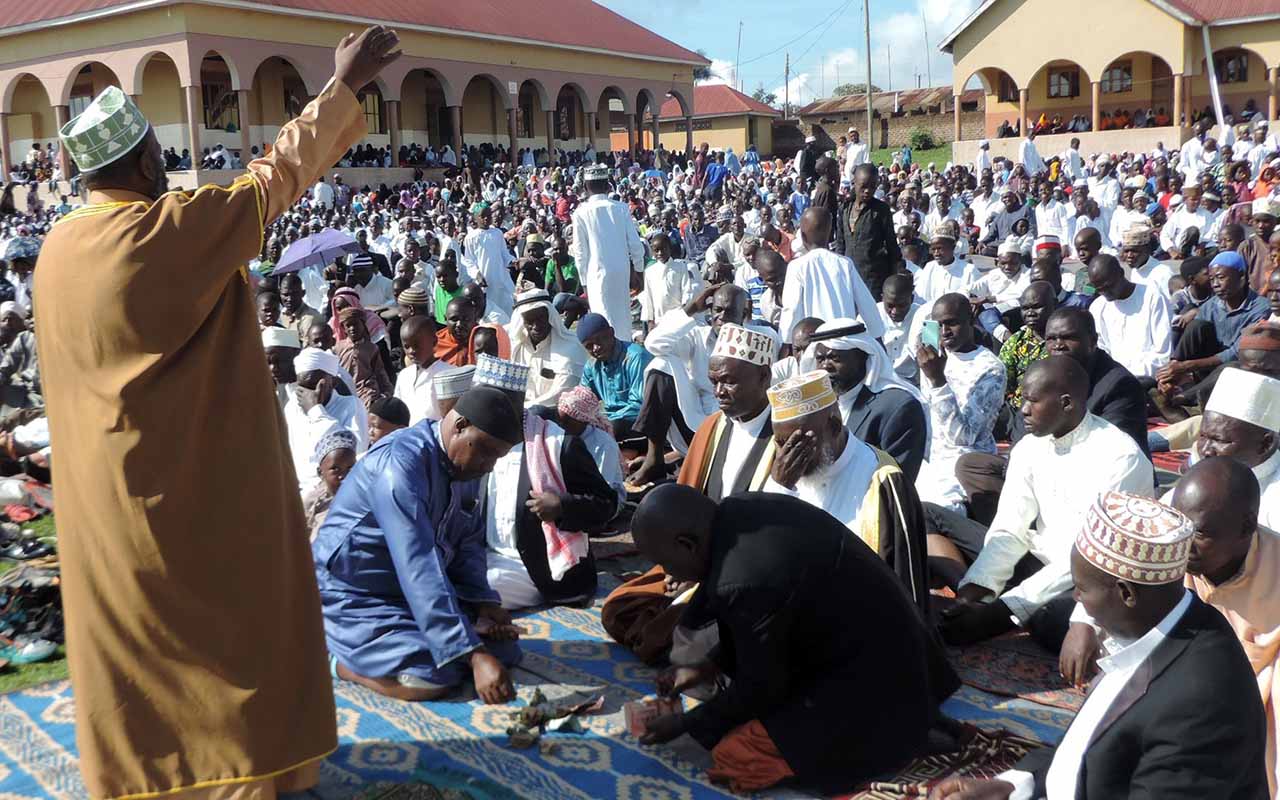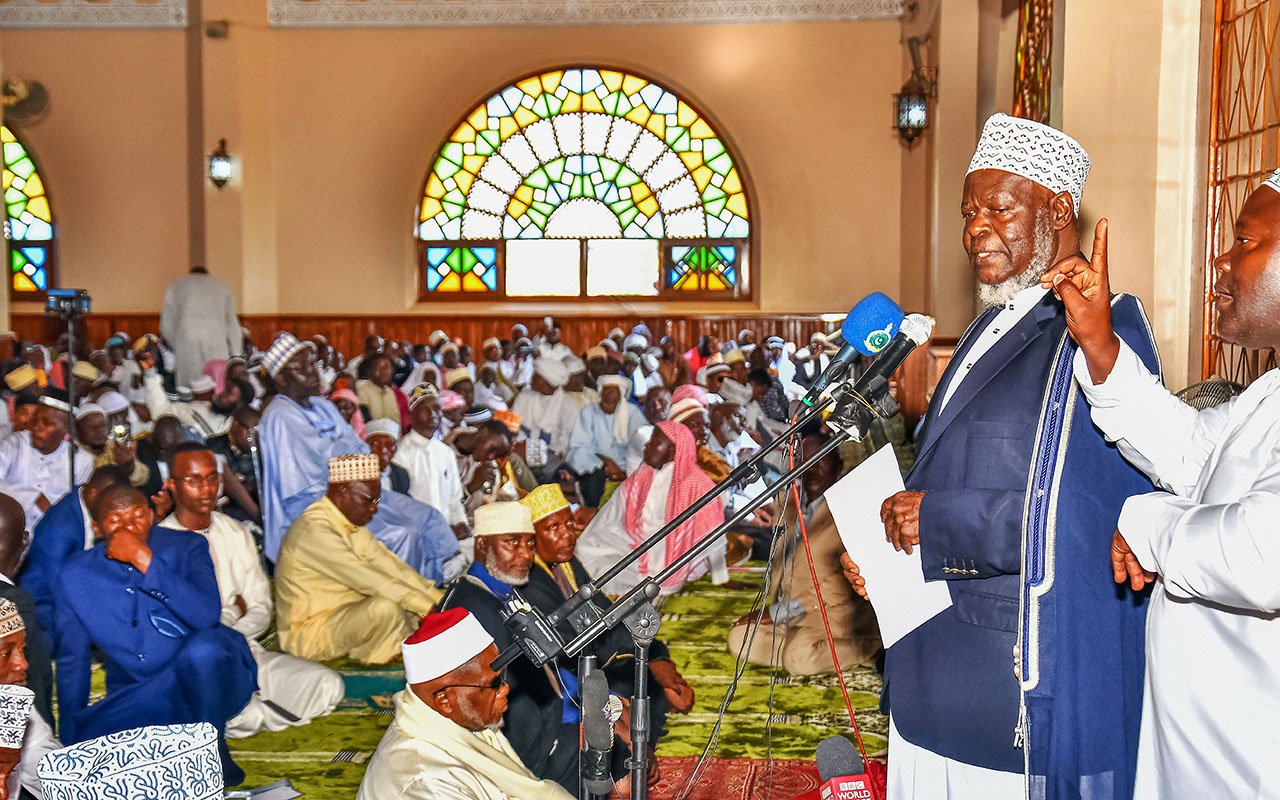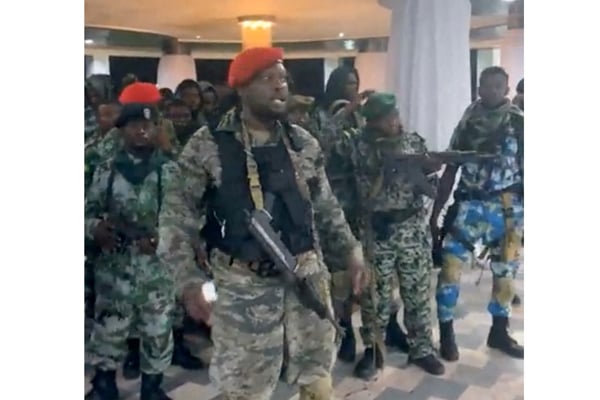Muslim leaders urge govt to resolve traders’ tax concerns

Sheikh Haikal Abed, the District Imam, preaches peace during the Idd prayers at Kamuli Muslim Grounds. PHOTO/SAM CALEB OPIO
What you need to know:
- The main preacher of the day, Abdrahaman Walusimbi, tasked those who are financially stable to support the needy, including the elderly, widows, and orphans.
A section of Muslim clerics yesterday used Idd ul-Fitr celebrations to task the government to dialogue with city traders and resolve the growing tax disputes that are threatening the business community.
Last week, traders went on strike protesting the implementation of the Uganda Revenue Authority’s (URA) electronic receipting system that tracks payments of Value Added Tax.
The Electronic Fiscal Receipting and Invoicing Solutions (EFRIS) system seeks to capture the exact sales and mandates traders to pay taxes to URA.
As Muslims across Uganda joined the rest of the world to celebrate the Idd ul-Fitr holiday, which marked the end of the Islamic holy month of fasting, the religious leaders said the issue at hand should be solved amicably so that traders do not suffer at the hands of high taxes.
“Both the tax collectors and taxpayers are Ugandans. They should have a roundtable discussion and agree on the way forward that is not detrimental,” said the head of the Kibuli Muslim faction, Sheikh Muhammad Galabuzi.
“We don’t want to see people close businesses six months after paying taxes imposed on them. We need each other,” he added.
At Wandegeya African Muslim Community Mosque, Mr Najib Buwembo, the president general, in his message to the faithful said the government should expedite the process of resolving the ongoing strike by the traders.
“We equally appeal to our government to look positively with consideration of the tax disputes raised by the business community to arrive at a meaningful business agreement for the benefit of all,” Mr Buwembo said.
While hosting the faithful at his home in Kibuli after the Idd prayers, Prince Kassim Nakibinge called for dialogue on the contentious taxes.
“URA should sit down with the traders because we need taxes. Government should also tone down on wasteful expenditure,” Prince Nakibenge said.
Ms Shamim Malende, the Kampala Woman Member of Parliament, stressed the need for the believers to continue praying so that the country can overcome the burden of high taxation and prolonged detention of political prisoners.
Sheikh Galabuzi also asked the government to release all political prisoners, especially those who were arrested and incarcerated during the 2021 General Election.
“It does not make sense for people to suffer in the name of democracy. I applaud [Kampala Catholic] Archbishop Paul Ssemwogerere for visiting detention centres and calling on the government to release all prisoners who are not on capital offences,” he said, urging other leaders to re-echo the message for the authorities to act.

Muslim faithful take part in Idd ul-Fitr prayers at Wandegeya Mosque in Kampala. PHOTO/FRANK BAGUMA
The main preacher of the day, Abdrahaman Walusimbi, tasked those who are financially stable to support the needy, including the elderly, widows, and orphans.
At Nakivubo Blue Primary School, the Secretary General of Tabliqs, Sheikh Jamil Mayego, demanded the release of the Muslim brethren who were arrested during Juma prayers.
He said Muslim brethren are languishing in prisons without proper legal proceedings.
Sheikh Mayego, however, commended the government for releasing some of the Muslims.
Elsewhere in the country, Muslims prayed for the honest acquisition of wealth, peace, unity, and love.
In the cities of Kampala, Gulu, Masaka, Mbarara, Jinja, Lira, Hoima, Mbale, Arua, Fort Portal, and Soroti, Idd prayers took place in various open spaces and mosques.
Special prayers were offered during Idd sermons, seeking blessings for the progress and prosperity of the nation, as well as the end of the Israel-Gaza war that has so far claimed about 33,482 lives, including 14,500 children and 9,500 women.
The acting mufti of the rival Uganda Muslim Supreme Council faction, Sheikh Abdallah Ibrahim Ssemambo, in his message urged caution.
“No doubt today (Wednesday) is a day of celebrations; we are required to be mindful of the limits to avoid tumbling into temptations and unlawful ways,” he said.
In Lango
In Lango, Sheikh Muhammad Yusuf Balinda, the supreme khadi of Lango, reminded the faithful that the end of Ramadhan is not the end of doing good deeds ‘because Allah the Most High wants us to continue worshiping Him in every microsecond that we live on this earth.”
“I, therefore, urge you to continue praying the five daily prayers, regularly reading the Holy Quran, giving a lot in charity, sharing and caring for the needy as you have been doing during the holy month of Ramadhan because we are not sure whether we will make it alive to the next Ramadhan,” he said.
He added: “I wish to inform you that laziness and begging have no place in Islam and we don’t encourage it. Muslims should embrace government programmes geared towards economic transformation and take the lead in eradicating poverty among themselves while not forgetting food security.”
Sheikh Badi Faraj, the deputy khadi of Acholi Muslim District, urged men to take up parenting if their children are to have a brighter future.
“My dear Muslim brothers and parents, especially the men, we have lost our responsibility as parents; we have left the work of parenting to women and that is very unjust,” he said.
In Arua City, Sheikh Abdulai Vuni, who subscribes to the Kibuli faction, asked President Museveni to support them in the purchase of the land where their headquarters is located.
“We have been trying to meet the President for quite a long period but those people around him are blocking us,” he said.
In Tororo, Muslims were urged to embrace unity and peaceful coexistence with other denominations as a way to foster development.
The call was made by the assistant Mufti and regional Kadhi Easter Muslim Region, Ahmed Haamid Wandega, while presiding over the Idd prayers at Tororo Main Mosque.
He said Islam, like any other religion, embraces peace and unity, adding that those involved in conflicts are pagans but hiding in Islam. Sheikh Wandega further appealed to the government to consider Muslims in all job recruitment, placements, and appointments.
The Tororo Resident District Commissioner (RDC), Mr Nickson Owole, applauded the Muslims for being law-abiding, adding that there was no Muslim that was arrested during the Holy Month of Ramadhan.
The deputy Resident City Commissioner for Nakawa, Sheikh Kassim Kamugisha, appealed to the Muslim community to continue praying for the end of corruption in Uganda because it is a vice that is undermining the country’s economic development.
In Tooro, Sheikh Abdul Hakim, the Khadi of Tooro Muslim District, urged all Muslims to be mindful of their security, especially during this time of heightened insecurity in the sub-region.
“In the case of visitors to our respective mosques or when encountering new faces, it is imperative that they introduce themselves first, and provide necessary details to prevent any potential issues. For individuals seeking accommodation at our mosques, they need to present a copy of their national ID and a letter from their village chairman,” he advised.
On marriage
At Kasese Main Mosque, Sheikh Yahya Abdu Rahman Muchika condemned divorce, which, he said, has become prevalent.
In Soroti, Muslim leaders urged their followers to maintain respect, love, and unity for one another irrespective of their social, political or religious affiliations.
Mr Muhammad Kizito, the imam of Capswahili Mosque, said that with love for one another, there will be empathy and care, peace and coexistence in the community.
The deputy District Kadhi of Teso, Sheikh Ramathan Ibwakit, said: “Muslims have been holy during the month of Ramadhan. and now that we have finished fasting, we expect you to remain holy and avoid any form of involvement in activities that may affect your spiritual life.”
Sheikh Ibwakit, however, appealed to the government to stop attributing terrorist activities to the Muslim religion and rather conduct thorough investigations to expose and crack down on the real criminal rackets.
In Jinja and Kamuli
In Jinja, Muslims decided to hold Idd prayers on a contested piece of land on Baxi Road next to Jinja Muslim cemetery (Kaburistan).
For decades, the Muslims used to celebrate Idd prayers at Muvele Crescent at Hajji Tarmac Road. But this time, they mobilised in big numbers and prayed at the contested land.
The contested land covers Plot 31 to Plot 39 just next to Jinja Hospital Psychiatry Ward.
In Kamuli, Muslim clerics prayed for peace in the Gaza Strip, honest acquisition of wealth, and an end to domestic violence in Uganda.
Leading prayers at Kamuli Muslim District Ground, Imam Haikal Abed said the continued harassment of the Muslims in Gaza by Israel is a total betrayal and genocide inflicted on the Muslims and should end.
Compiled by Jane Nafula, Bill Oketch, Anthony Wesaka, Karim Muyobo, Stephen Otage, Al-Mahdi Ssenkabirwa, Felix Warom Okello, Tobbias Jolly Owiny, Philip Wafula, Alex Ashaba, Joseph Omollo, Fred Wambede, Joanita Adong, Denis Edema, Robert Muhereza, Obed Kankiriho, Opio Sam Caleb, George Muron, Clement Aluma, Robert Elema, Jovita Kyarisiima, Scovin Iceta, Marko Taibot & Jerome Kule Bitswande




